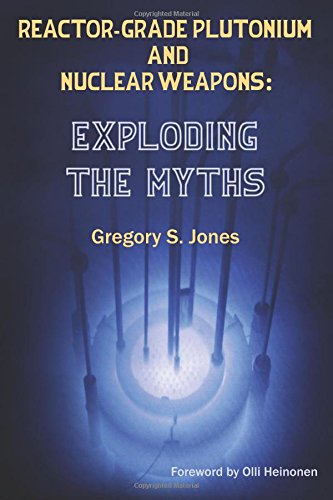


Reactor-Grade Plutonium and Nuclear Weapons: Exploding the Myths
R**Y
Five Stars
Good read
J**I
A lucid exposition…
In the interest of full disclosure, right up front, this book was written by my brother. Though we have had our political differences over time, I was in general aware of the nature of his work, and that he had worked for many years at the RAND corporation, and one of its derivatives: Pan-Heuristics. Furthermore, I felt my brother’s work might address some of my own concerns about that vast area encompassing nuclear power and nuclear bombs. Turns out those specific concerns were not addressed, as the author makes clear at the beginning of his work. My concerns involved the storage of nuclear waste throughout the country at the nuclear plant sites and the vulnerability this poses: how easy would it be to steal, and have a few knowledgeable individuals put together that proverbial suitcase bomb? That too is not addressed; in Jones’ work these knowledgeable individuals work for nation states attempting to create their own nuclear “deterrent,” as those that possess nuclear weapons like to say.One of my roommates in college went on to obtain his PhD in Physics. I also have a degree in Physics, but of the lowest order of magnitude, and have never used it professionally. In the mid-70’s my former roommate showed me one of his Physics papers. Although I knew the meaning of every word in the sentence, as a whole, I could obtain no meaning from a single sentence. I asked him: how many people in the world do you think understand what you have written? His response: Ten! Furthermore, he explained that in the first part of the abstract, there was real meaning, but the latter part, he admitted, he was “blowing a little bit of smoke.”The real strength of my brother’s work is that he managed to write a work that the non-specialist in the field, for example, me, could understand it all! It is a very lucid exposition of a very arcane subject, that I suspect not more than a few hundred people have reasonable knowledge of. It has nothing to do with terrorists (if you set aside the idea that a state can be a terrorist, which may or may not be valid), nor does it have to do with the safe storage of radioactive material, and the safe operation of reactors, a subject again in focus after the Fukushima Daiichi nuclear disaster.The key issue in Jones’ work, as the title suggests, is the ability, with a bit of knowledge, to build a nuclear weapon with “reactor-grade” plutonium. An eye-opening stat from the first chapter: the 400 operating nuclear power stations in the world have generated a stockpile of 2,400 metric tons of plutonium. And it is just “laying around,” in various locales, with a lot of it in Japan, of all places. Quite a heap for a substance that generally does not occur naturally. Jones does a good job of explaining the difference between “reactor-grade” plutonium and “weapons-grade plutonium, and how that difference is a “movable feast,” that is, has changed over time. Moreover, as the author argues, there is no real difference, since what is labeled “reactor-grade” can still make a bomb, just with a bit more finesse. Can plutonium be “spiked,” or, as the author says, using the word generally associated with alcohol, “denatured,” so that it is unfit for bomb-making? Many in the nuclear industry have argued that it can; Jones argues persuasively that it cannot.The author devotes a fair portion of his work to the history of the development in various countries, such as the USA and the UK, but also Pakistan and Sweden. Sweden!?... the “moral superpower,” as some Swedish friends would sardonically quip. Yes. It’s those “Ruskies,” you should understand (Note: they did stop their pursuit of “the bomb,” for reasons that the author does not expound upon.) Canada, a non-nuclear country, makes atomic reactors, and sells them to countries like Pakistan and Iran, which can use them to obtain the plutonium, thereby obviating the need to filch some from Japan. “Proliferation matters,” as my brother’s eponymous website proclaims.One of the drawbacks of the book, and it is common to reporters, in particular, who publish books that are composed of articles they have published over a period of time, is that there are redundancies. Several times the nature of Plutonium 240 was explained.“Beyond the scope of this course,” as they said in college, and no doubt Jones would concur in regards to his book, is how the political decisions are made that determine why it is OK for some countries to have nuclear weapons, but not others. Most jarringly, President Bush once proclaimed that because of India’s “culture,” it was OK for them to have atomic weapons, but not Pakistan. Hum. And Jones provides no insights as to Israel’s nuclear bomb program. Overall, 4-stars.
Trustpilot
1 day ago
2 months ago